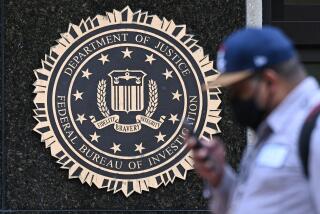Father-Son Relationship : Ties to McFarlane Help Explain North’s Actions
- Share via
WASHINGTON — Ollie North’s boss wanted to protect him from congressional heat.
And Robert C. McFarlane thought later that North, in turn, was trying to repay the favor by seeking to protect him from the fallout of the Iran- contra scandal.
Those two facts are emerging from congressional hearings as partial explanations for two of the scandal’s most perplexing questions: How was Lt. Col. Oliver L. North able to operate virtually unchecked as a White House swashbuckler in the sale of arms to Iran and the diversion of funds to the Nicaraguan rebels? And why, after the scandal began unraveling, did North shred internal White House documents?
McFarlane, in testimony Wednesday, said that he and North were “very close.” Indeed, some have said that theirs was like a father-son relationship, even though McFarlane is only a decade or so older. He, too, was a Marine lieutenant colonel, and some have suggested that he saw in North a younger version of himself.
And, in two previous days of testimony, President Reagan’s former national security adviser praised North, who was fired from the National Security Council staff last November, at length.
North “was a very solid, determined, energetic, devoted officer,” McFarlane said. “. . . Ollie was probably the most mission-oriented, can-do professional on the staff.”
McFarlane acknowledged that, although he gave North instructions to stay within the boundaries of the congressional ban on U.S. aid to the contras, he knew that his subordinate “probably . . . would on occasion go beyond.”
But, McFarlane said, “I don’t fault him for it . . . . I don’t fault him for having been an imaginative, aggressive, committed young officer.”
In fact, McFarlane outlined how he sought to shield North from congressional inquiries into his extensive private fund-raising efforts for the contras. When the inquiries arrived from Capitol Hill, McFarlane said, he questioned North and, accepting his explanation that “he always referred potential donors to the contra leadership itself,” asked him to prepare responses to the congressional letters.
Signed Responses
“He brought them to me. I went over them and signed them, expressing, I have to say, too categorically that the NSC staff, and specifically Col. North, had not broken the spirit or letter of the law,” McFarlane said.
“Looking back, I think that, while in any event it is my responsibility, not Col. North’s, that suspicions that I had ought to have led me to be more probing and to get more concrete information one way or the other.”
The former Marine officer turned to North’s combat experience in Vietnam to explain his dedication to the contras. He said North felt the United States had abandoned South Vietnam--a conviction that left him “quite cynical about government.”
“I believe that he committed himself to assuring that he would never be party to such a thing again if he could prevent it,” McFarlane said. Congress’ decision to cut off aid to the contras in 1984, McFarlane said, appeared to North to threaten another Vietnam.
“We had made a commitment to people that he could see we were just about to break, and . . . the bottom-line consequence of that would be the death of a lot of people--contras--and . . . he couldn’t be a party to that,” McFarlane said.
Several times in his testimony, McFarlane spoke of his close personal relationship with North and of his admiration for North’s “gumption.” At one point, he expressed concern that “Ollie is really getting a bad rap, which appears to be endorsed by me, and I don’t intend that.”
McFarlane made clear in his testimony that he believed North had also sought to shield him from full details of North’s actions to “protect” McFarlane from the potential fallout.
Later in his testimony, McFarlane said that, when North talked of a “shredding party,” he interpreted his former aide’s plans to destroy documents as stemming from “his sense of obligation to me, to protect me . . . .”
Protection Questioned
“Do you believe that--in hindsight--that it protected you?” McFarlane was asked. “Or do you think, in hindsight, that it exposed you to more risk?”
McFarlane replied: “Well, my presence here today would indicate that it probably didn’t help. No, sir, I think it’s well meaning but the wrong thing to do.”
But McFarlane said that he alone, not North, was at fault for any errors that were made.
“And I don’t know what else I can tell you to make clear that there is nothing that North did for which I don’t feel responsible,” he testified. “And I don’t even know today what all that is.”
More to Read
Get the L.A. Times Politics newsletter
Deeply reported insights into legislation, politics and policy from Sacramento, Washington and beyond. In your inbox twice per week.
You may occasionally receive promotional content from the Los Angeles Times.










